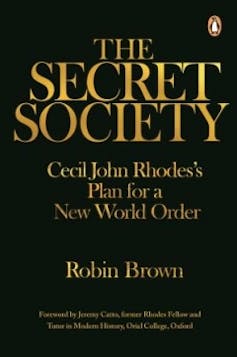Rhodes: closet gay man who hatched a secret society to promote empire?
THE CONVERSATION
Almost 114 years after the death of Cecil Rhodes his memory lives on, with the Rhodes Must Fall campaign spreading from Cape Town to Oxford.
Once glorified by white colonialists, Rhodes is now more widely viewed as a prime villain in southern African history. Since his death he has been the subject of more than 30 biographies, so one is left to wonder if there is anything new that could be said about him. An attempt is made in the latest book by Robin Brown, The Secret Society: Cecil John Rhodes’s Plan for a New World Order – an attempt that fails.
The main claim of the book is that Rhodes established a “secret society” whose task was to extend British rule across the globe. This society continued to exist in different guises long after Rhodes’ death in 1902. Thereafter the society came to operate within, or under the guise of, other bodies – the Rhodes Trust operating as the “top layer of the structure”; in 1909 the society was renamed the Round Table; and from 1920 the Institute of International Affairs became its new face.
The book adds another dimension to this central thesis, making a rather startling assertion on page 144:
… a homosexual hegemony – which was already operative in the Secret Society – went on to influence, if not control, British politics at the beginning of the twentieth century.
Rhodes himself, the book alleges, was gay, and because homosexuality was a criminal offence in Britain at the time, he realised that gays only survived if they operated in:
… a society that remained secret, ring-fenced by wealth and political influence.
So it appears that the society’s secrecy was necessitated by both imperial aspirations and sexual inclinations.
The book contains major flaws, the chief of which is the lack of solid, supporting evidence. Brown claims that “Rhodes documented everything” – which was not actually the case in this regard. Just about the only documentary evidence cited to support the existence of this secret society is the codicil attached to Rhodes’ first will, which did indeed proclaim his intention to form such a society.
The problem is that this will was drawn up in 1877 when Rhodes had not yet accumulated great wealth. According to this early will he would leave all his worldly goods in trust to allow for the formation of a secret society, but his limited wealth at the time could hardly have made this possible.
The plan to form such a society also did not appear in Rhodes’ final will. One has to agree with Robert L. Rotberg – whose biography of Rhodes is the most substantial – that to read Rhodes’ plan today is:
… to sense the ruminations and even fantasies of a madcap bumbler.
Each chapter of Brown’s book has just a handful of endnotes, and there are hardly any references to source material that might substantiate the claims made. The problem is highlighted on pages 237-38. First it is stated that there is “clear evidence” that Lord Alfred Milner took over and transformed the secret society after Rhodes’ death. But on the very next page Brown writes that during this transformation process Milner “kept things covert” so that ‘there is little hard evidence’ of the society’s existence at the time.

This is the problem throughout the book – because the society was so secret it presumably kept no surviving records, meaning that there is no proof of its existence. The book thus comes to be based heavily on surmise and assertion. While critics can argue that it is impossible to prove that the society existed at all, Brown can retort that it is impossible to prove that it did not exist. What cannot be contested is that the book lacks referenced source material to substantiate its claims.
The suggestion that the Rhodes Trust was closely linked to the secret society is not credible. In Anthony Kenny’s massive book on the history of the trust there are only three brief references to the idea of a secret society – and one of those is to a letter by Leo Amery stating that there was no such society.
The book contains some basic errors which undermine one’s confidence in the content and analysis. The cotton farm where Rhodes joined his brother on arrival in Natal in 1870 was not north-east of Durban, but to the west (p.6). Rhodes was not “of the era of British reformers who caused slavery to be outlawed”, nor did he display “liberal attitudes towards blacks” (p.19). Jameson was imprisoned for four months, not one (p.22). Rhodes’ brokers were not John Rudd and Robert Moffat – they were Charles Rudd and J.S. Moffat (p.57).
George V did not precede Victoria (p.154). Clinton’s presidential nomination speech was in 1991, not 1981 (p.168). Chamberlain was the colonial secretary, not foreign secretary (p.222 and elsewhere).
The book would have worked better had it been presented as an examination of the personal networks that Rhodes developed. There is no doubt that he succeeded in cultivating influential figures in the world of politics, business and finance in Britain, but Brown’s attempt to conjure up a secret society out of these networks is misguided and not adequately substantiated.
The Secret Society: Cecil John Rhodes’s Plan for a New World Order is published by Penguin.

